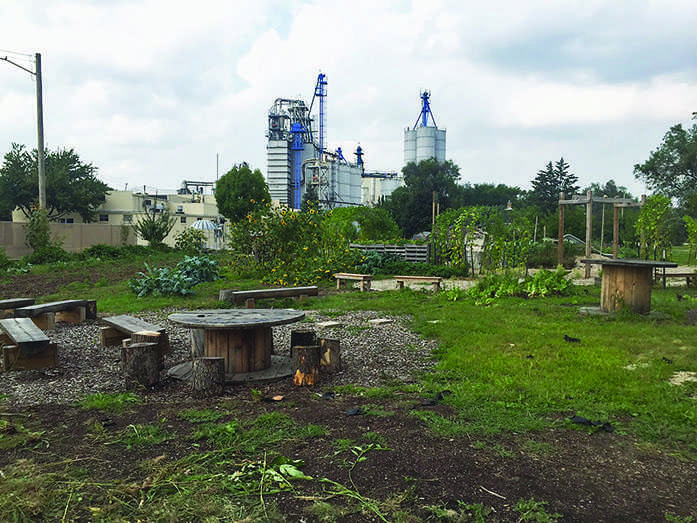Urban farming trend reaches Johnson County.
By Ali Krogman
[email protected]
For Johnson and Linn Counties, urban farming means more than just planting seeds in the ground.
Roughly 800 million people practice urban farming
worldwide, and the trend is on the upswing. Bonnie Riggan, the owner of Calico Farm in Iowa City, is one of those farmers.
“The thing that sticks out to me about urban farming is that it’s a great way to have a sense of community,” she said. “Whether you’re a customer or a farmer, that feels pretty good.”
Riggan farms more than 30 crops on one-third of an acre on her three-acre property near North Dodge Street. She considers herself having the best of both worlds for her urban farm — tucked away and surrounded by trees, yet still in town.
She said she loves the idea that her customers know her and can run into her on a walk down the street.
Community seems to be a growing theme in urban agriculture.
Jennifer Pratt, the director of planning services in Cedar Rapids, said she’s seen the positive impact urban farming has had in the Cedar Rapids community.
“It’s a resource that brings people together in neighborhoods,” Pratt said. “There are lots of different ways urban farming has become a community conversation here.”
Matthew 25, a nonprofit organization in Cedar Rapids, is one of those spurring the conversation. The organization uses the empty spaces left in neighborhoods after the devastating flood of 2008. The group farms two acres of plots in the area with more than 60 crops.
“At first, we were responding to the food-security issues in the neighborhood after the flood,” said Eric Christianson, the product manager at Matthew 25’s urban farm. “That was our first target, but now, it’s city-wide.”
One of Matthew 25’s goals is educating community members about how food grows and where it comes from.
“So much of how our food system works now is that it’s removed from people’s everyday lives,” Christianson said. “By doing it where you can easily see how the vegetable production part works, we’re lifting that veil a little bit.”
Christianson said kids are the organization’s main audience. There are five student gardens Matthew 25 has helped start in the area.
“Very few kids learn about how things grow and where their food comes from,” he said. “This is really how they get a taste for things as well.”
In Iowa City, students are hoping to teach each other and community members the importance of knowing where they get their food.
“We’re trying to promote local, organic food in the community,” said Jake Simpson, a co-president of the University of Iowa Student Garden. “The garden provides a great opportunity for students and community members to learn how to grow sustainable produce.”
The student garden encompasses around one-third of an acre and has all sorts of vegetables. The members are passionate about organic farming.
“We’re working on going to no-till, and we don’t use pesticides,” Simpson said. “We test our soil to make sure there is no contamination.”
Soil contamination is just one of the concerns urban farmers have for their produce.
“We experience theft,” Christianson said. He said recently he saw someone walking off with three bags full of food. “But our mission is to get food to whoever needs it.”







